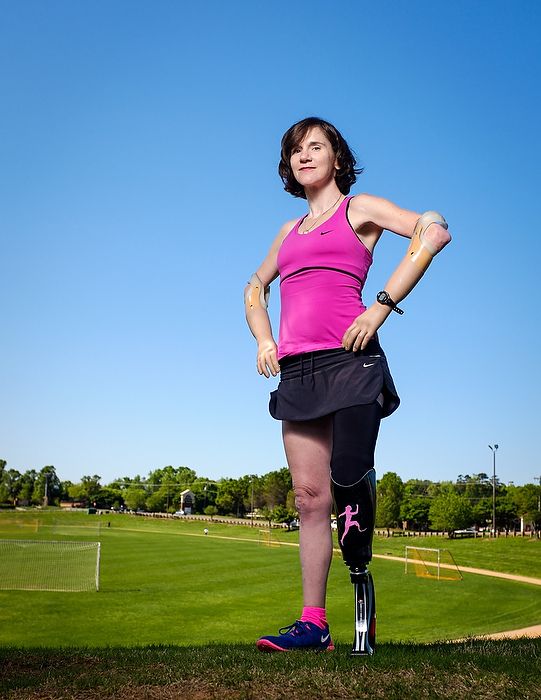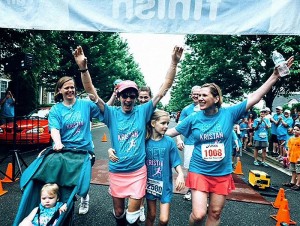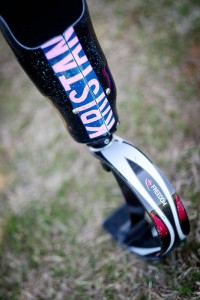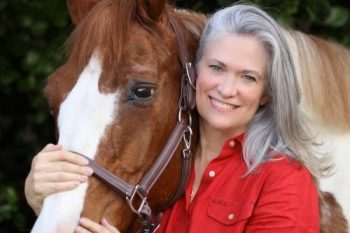When I graduated from Wake Forest, I had big plans for my life. I wanted to get my counseling license, start a private practice and have a big family. In many ways, my dreams came true. I am a wife and a mother of five children ranging in age from 2 to 11. I earned my licensure and worked in private practice. I became a stay-at-home mom and an exercise instructor with a passion for running, even qualifying for the Boston Marathon. But in 2013, my life plan fell apart.
I got the flu and strep throat. That turned into double pneumonia and sepsis, which ultimately led to septic shock. As my organs were failing, I was put into a medically induced coma. It took six hospitals, 100 days and millions of prayers, but I came through with a miraculous recovery. But not without cost. Both hands, one foot, and the toes and heel of the other foot were amputated.
To come back from medical catastrophe, did it take a lot of hard work? Yes. Prayers? Yes. Did it hurt? Absolutely. It still does.
I owe a debt to wounded warriors because the technology advances that helped them helped me. I was fitted with state-of-the-art prosthetic hands, even a fancy running blade. At the rehab hospital I spent the first three days learning to open and close my robotic hands — one-fourth of the way, one-half of the way, three-quarters of the way, all the way. Repeat. I began each day with weighted leg lifts, arm circles and core-strength work.
Next came mom-skill goals: Put juice into my toddler’s sippy cup and walk across the room with a Styrofoam cup of water. I spilled a lot of juice and crushed a lot of Styrofoam. At times my hope faltered. But I continued and set new goals: Carry my toddler upstairs. Drive a car. Run a 5k!
At Wake Forest, I learned in my studies that there are predictors of resilience: self-confidence, psychological health, intelligence, optimism, previous successes in the face of trials and a supportive family and community. Luckily, I have them all. But the truth is that no one knows how he or she will react to a tragic turn in life until it happens. If you had asked me a year ago if I would be able to bounce back, my answer would have been quick and resounding: “No!” But I have never been one to accept defeat. I looked at the pictures of my playful kids on the wall of my many hospital rooms, and I saw the encouraging, hopeful look in my sweet husband’s eyes, and I knew I could accomplish anything.
"Resilience is not letting anyone or anything beat you."
I am bolstered by my faith, my family and my community. My professors and classmates from Wake have reached out to me with encouragement and hope — even fed my family dinner on occasion. One classmate traveled to Charlotte to participate with her family in “See Kristan Run,” a charity 5k organized in my name. My community packed lunches and prepared dinners.
 Personal attitudes and actions may signify resilience, but they aren’t done in a vacuum. It takes a community. With the help of so many, I am now, once again, living the big, busy life of a mom who works out, teaches group exercise, volunteers at school, coaches Girls on the Run, shuttles my kids to activities, signs reading logs and tucks her children in bed. I once viewed these activities as obligations. Now, I consider them gifts.
Personal attitudes and actions may signify resilience, but they aren’t done in a vacuum. It takes a community. With the help of so many, I am now, once again, living the big, busy life of a mom who works out, teaches group exercise, volunteers at school, coaches Girls on the Run, shuttles my kids to activities, signs reading logs and tucks her children in bed. I once viewed these activities as obligations. Now, I consider them gifts.
Kristan Graham Seaford (MAEd ’01) is a licensed professional counselor who lives in Matthews, North Carolina, with her husband, Brook Seaford (’97), and their children. People magazine featured her story of recovery and gratitude in November. Last Dec. 6, she ran a 5k. Her website is seekristanrun.racesonline.com



